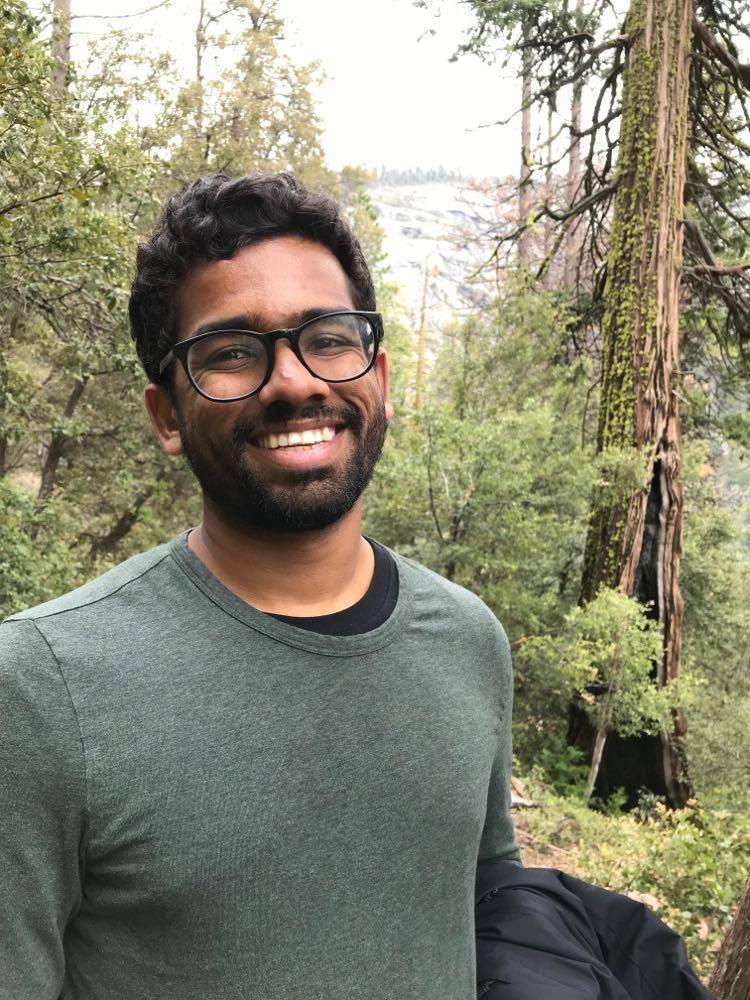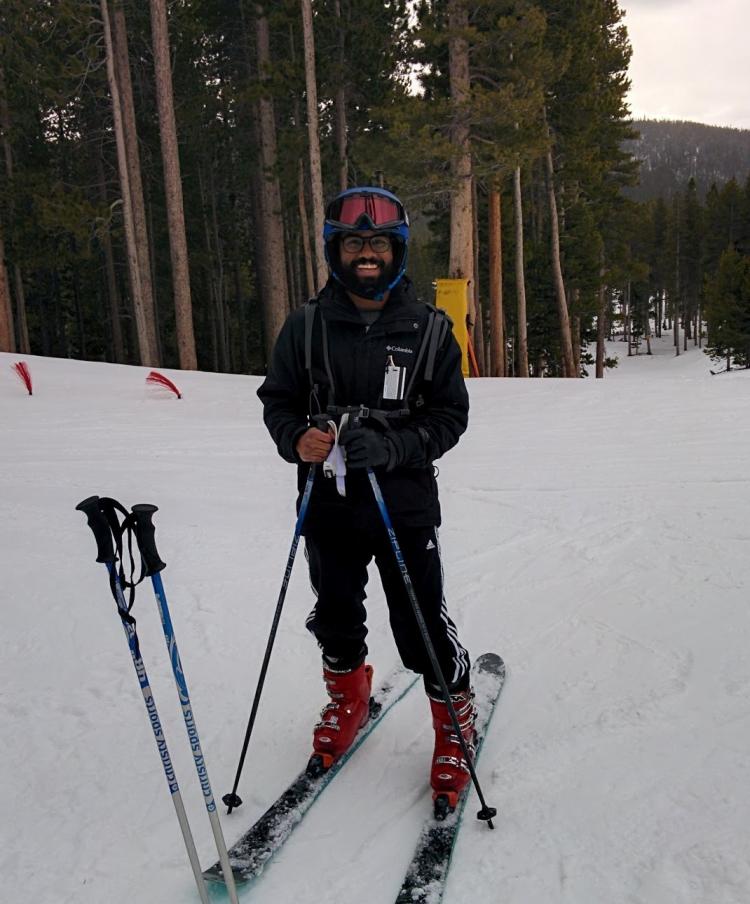Outstanding Student Q&A: Shankar Lalitha Sridhar, Outstanding Dissertation Award

Outstanding Dissertation Award winner Shankar Lalitha Sridhar.
Share about your background. What led you to study engineering?
My undergraduate background is in Civil Engineering and I have a master's in structural engineering from the Indian Institute of Technology Madras in South India. My master's thesis was focused on developing a computational tool for a complex material model that was relevant for a variety of different materials ranging from concrete to soft tissues. This piqued my interest in describing the mechanical behavior of materials using concepts of physics and mathematical tools. I eventually transitioned into mechanical engineering when I moved to the United States for my master's at Texas A&M before joining CU Boulder for my PhD.
There is a funny saying in India that a child is designated as either a doctor or engineer as soon as they are born. I guess in my case, I became both. But jokes aside, I really enjoyed learning physics and mechanics in high school and engineering seemed a natural choice to pursue a technological career that is open-ended enough to offer paths to a variety of different careers. And after 11 years in engineering school, I’d say I have indeed found that to be true.
What is the title of your dissertation? Can you give a brief summary of your findings?
The title of my dissertation is Mechanics of transient networks: an interplay of dynamics and microstructure.
The main topic of my dissertation relates to developing theoretical models that describe and predict the mechanical behavior of soft materials. Particularly, the focus was on polymer networks whose microstructure is dynamic and continuously reconfiguring itself in real-time. Many biological systems rely on such polymers (e.g., proteins, DNA, etc.) for achieving most of the key functions of life including growth, reproduction, locomotion, self-repair, etc. A particularly difficult aspect of modeling such materials is connecting the average properties of the polymer configuration to macroscopic aspects like stress, mechanical stiffness or viscosity and their evolution with time. In my dissertation, I present computational/theoretical models to explore the emerging mechanical behavior of transient polymers arising from: (a) spatial heterogeneity of degradation and growth in a polymer network with applications to holographic photopolymers and tissue engineering, (b) reversible cross-linking to produce nonlinear behavior such as shear thickening, and (c) molecular ordering to produce interesting anisotropic behavior with applications to the cell wall mechanics of fungi, and programming liquid crystal elastomers for actuation.
Understanding the interplay between structural components of a material and its dynamics through theory and modeling can deepen our understanding of the biological machinery. Importantly, they can inspire smart synthetic counterparts that have far-reaching impacts in the field of biomedicine, soft robotics, 3D printing, etc.

Shankar Lalitha Sridhar learned to ski while studying in Colorado.
What have you enjoyed most about your research?
I love learning new things. And coming into my PhD, I did not have much of a background in biological processes or polymeric materials. I enjoyed the challenge and loved learning about biopolymers and bringing skills from my training on strength of materials as a civil/mechanical engineer.
Having mostly been a user of existing theoretical models in my undergraduate and master's programs, I found it very satisfying to be on the side of proposing new models. And seeing it come to life through predictions and graphical simulations was icing on the cake.
Last but certainly not least, learning to put my work in perspective to understand why it would matter to other people and the skills to communicate that effectively was definitely the most meaningful aspect of research to me.
Who is your research advisor and what lessons have you learned from them?
My advisor was Prof. Franck Vernerey. The most important thing I have learned from him is thinking big and cultivating self-confidence. He helped me set high bars for myself that I hope I will be able to raise even higher in the coming years. He has a major contribution in motivating me to think bigger, smarter and bolder. He has also helped me develop useful time management techniques and cultivate self-confidence by involving me in multiple projects, proposal writing, preparing course content and preparing presentations for esteemed research conferences. And finally, the art of making connections and collaborating with fellow researchers in a diverse field is something for which I will be eternally grateful to him.
What accomplishment from your time at CU Boulder are you most proud of and why?
If I have to decide on one accomplishment that I am most proud of, it will have to be my skiing skills. I had not set foot on a ski resort in my life before joining CU Boulder. And the first time I did, it was actually with my research advisor and our team. And like his teaching style with scientific research, I was essentially taken on the ski lift and asked to jump off. And I picked up skiing fairly quickly after that. It showed me that taking a leap of faith and the passion/mindset to learn something no matter what are all you need to succeed, and a strong presence of this quality almost always underlies success in scientific research. The most significant obstacles in our path to success are often the ones we create in our heads.
Do you have any plans for the future after you graduate? If so, what are they?
I would like to remain in STEM and pursue research on materials science and explore new types of materials to develop a deep understanding of their behavior. Currently, I am a postdoctoral research associate in the BioFrontiers Institute under the supervision of Dr. Loren Hough from Physics. I am open to and pursuing opportunities in R&D in the biomedical and polymer industries, in addition to a research career in national labs like NREL, Oak Ridge and Lawrence Livermore. I think I’d like to return to academia one day and take up teaching to give back to the community, but right now what excites me is the opportunity to work on a large-scale project with a huge team of expert researchers.
What is the impact you hope to have on the world one day?
I think I would be satisfied if my work results in incremental progress in the lives of other beings in this world. I believe that is one of the most amazing features of the scientific revolution where each generation gets to add to the collective knowledge of humankind to make the world a little bit better than it was before. An immediately obvious path I can see for my scientific research background is the field of biomedicine to have an impact on the health of so many people. However, my horizon is wide open, and I see myself contributing toward causes I care about, even if not directly scientific in nature, including tackling climate change, animal cruelty and human suffering in this world. At the end of the day, it is our connection to and care for each other that should matter the most and is at the core of a life well-lived.
Is there anything else you would like to add?
My family that includes my parents, brother and sister have been my rock during my PhD, and their role in making this happen cannot be emphasized enough. My advisor has been an invaluable ally in my path to a doctoral degree and his guidance will have a long-lasting impact on me. Finally, I am eternally grateful to my friends and partner who made my time in Boulder that much more enjoyable. The PhD journey is never an easy one, and I think I found a lot of meaning in the relationships I developed and learned a lot about myself in the process. And if I had to, I would do it all over again with no hesitation.

